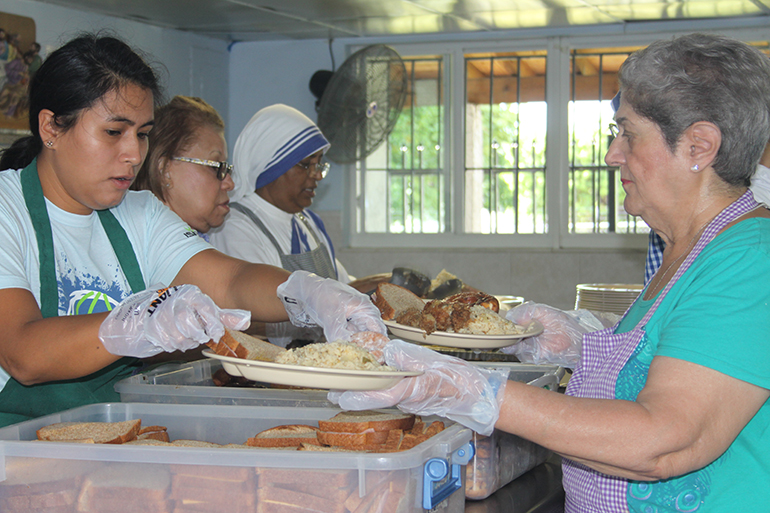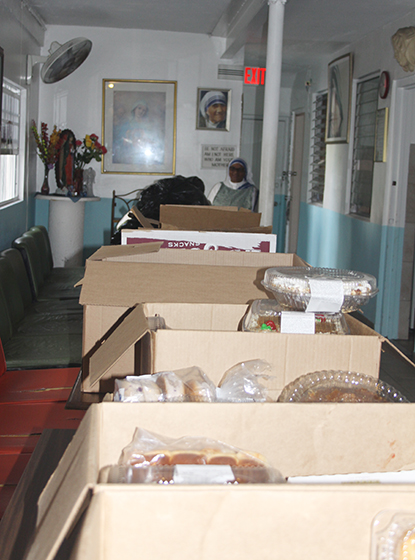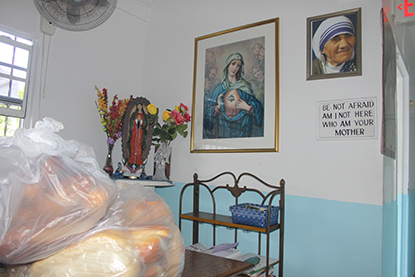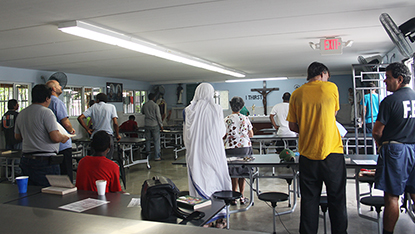By Rocio Granados - La Voz Catolica

Photographer: ROCIO GRANADOS | LVC
Volunteers serve an average of 300 meals a day at the Missionaries of Charity soup kitchen in Miami. At left, Johana Vargas puts bread on the plates that fellow volunteer Marta Maria Gomez-Cortes will distribute to the homeless.
MIAMI | Moved by the need, and the simplicity, of giving food to the hungry, Asís López became a volunteer at the Missionaries of Charity shelter in Miami. Since December of last year, he has helped there alongside other members of the young adult group from St. Augustine Church and Catholic Student Center in Coral Gables.
“The people who come here are people like me who perhaps did not have the blessing and privilege that I had,” López said. “Thank God I never suffered, I never went hungry, I never spent a day on the streets. These people did not have those advantages, but they are exactly like me. They are human beings created in the image of God, my brothers and sisters. I want to serve them.”

Photographer: ROCIO GRANADOS | LVC
Sister Anthony stands behind the bounty of donated food that arrives daily at the Missionaries of Charity shelter in Miami, and which feeds the poorest of the poor on Miami's streets.
López, 27, sells real estate, and he takes off one day a week to help the Missionaries. “On weekends they have a lot of volunteers, but during the week, unfortunately, no,” he said.
The Missionaries of Charity are the religious congregation founded in 1950 by St. Teresa of Kolkata (formerly Calcutta), to serve the poorest of the poor in India. In 1981, she opened the home in Miami with four sisters. Today, it is one of more than 600 throughout the world.
With the help of volunteers, the Miami Missionaries feed the needy who live on the streets surrounding the shelter, which is located near Overtown, one of Miami’s poorest neighborhoods.
But working with the poorest of the poor is not actually the vocation of the Missionaries of Charity.
“It is to belong to Jesus, and to do that we must love and serve the poorest of the poor,” said Sister M. Inmacula, regional superior of the Missionaries of Charity in Haiti, the U.S., the Dominican Republic, Puerto Rico and the Virgin Islands, during a recent visit to Miami.
“We feed the poor because they need food, they are poor and you can see that when you look at them,” said Sister Anthony, one of the seven sisters who work at the Miami shelter and one of 5,000 Missionaries of Charity throughout the world.
Not only do the homeless lack shelter, they also “feel alone, they are rejected, despised, completely alienated from society. We treat them with dignity so that they might regain their dignity,” Sister Anthony added.

Photographer: ROCIO GRANADOS | LVC
Bread and pastries are some of the donations that arrive daily at the Missionaries of Charity shelter near Overtown in Miami. Their soup kitchen provides about 300 meals a day to the homeless.
Aside from giving the homeless with a warm meal daily, the Missionaries also provide clothing and personal hygiene items to those who request them.
They also feed them spiritually. “At least 10 minutes, but we don’t force them to listen. Some come in, some don’t,” said Sister Mángala, superior of the Miami convent. On Fridays, the Missionaries also host a Holy Hour before opening the soup kitchen.
“Mother Teresa wanted not only to care for the poor but to bring souls to Christ and bring Christ to souls, especially to the poorest of the poor, to the sick, the abandoned, the lonely, those who live on the streets,” said Sister Inmacula.
The Missionaries’ soup kitchen is open every day except Thursdays and provides meals for about 300 people daily, mostly men. It’s a number that’s constantly rising, Sister Mángala said. Most of those they serve are Christians but there are also people from other religious denominations.
The shelter opens its doors at 8 a.m., when one of the sisters hands out numbered tickets. At mealtime, “we always say a prayer, then read the readings of the day, say an Our Father, pray to Mary, fill the plates with food and hand them out, one by one,” López said.
If any food is left over, the Missionaries go out to the streets in the afternoons to give it out to the homeless who congregate under bridges and in other places in the city.
The Missionaries rely totally on donations but have never lacked for food.
“Divine Providence has always come through, since Mother began her work,” said Sister Anthony, recalling a personal experience when she worked with the Missionaries in Chile.

Photographer: ROCIO GRANADOS | LVC
Every Friday, the Missionaries of Charity observe a Holy Hour before serving food to Miami's homeless. They pray the rosary in English and Spanish with any homeless persons who wish to attend.
“We had a soup kitchen for children and that day, one of the sisters said, ‘We have nothing for tomorrow.’ I told her, God will provide. We went to the other house, where we had our convent, and when we arrived, around 7 p.m., a car was parked outside. A couple were waiting for us � They brought rice, meat, bread, everything. It’s Providence; the Lord never abandons the poor,” Sister Anthony said.
In Miami, the Missionaries also have a temporary shelter for women, with 25 beds where they can stay for up to three weeks. The shelter allows them to bring their children, although in the case of boys, they have to be under 5 years old. The shelter opens at 4 p.m. and closes at 6 a.m.
“The shelter is very simple, but comfortable. We don’t have elevators or air conditioning,” Sister Mángala said.
The Missionaries’ work has yielded fruits, “fostering change in the people they have helped,” said Marta Maria Gomez-Cortes, a volunteer for nearly two years.
She remembered the case of a young woman who was addicted to drugs who was rescued from the streets by the sisters. “She told how the prayers of the sisters helped her and led her to confession after many years, and now she is a whole other person.”
“In this house, I have seen men come in without even wanting to show their faces, and later they are friendly, they trust us and we can trust them,” said America Galvan, a volunteer since 2007. “This is the work of Mother Teresa.”
It’s work that was recognized innumerable times when she was alive, including the Nobel Peace Prize she received in 1979. After her death in 1997, she was beatified only six years later, by Pope John Paul II � now also a saint. Pope Francis officially declared her a saint Sept. 4, with her feast day set for Sept. 5, the anniversary of her dath.
“Mother Teresa bestowed many graces on many people, especially the poorest of the poor, because Jesus asked her to care for the poor. This is a moment of grace for the Church, for the poor, and especially for us, the Missionaries of Charity, the daughters of Mother Teresa,” said Sister Inmacula.”
“Mother Teresa was always very maternal with everyone,” recalled Sister Anthony, who met the Church’s newest saint when she entered the congregation in Kolkata more than 20 years ago. “She taught us to see the face of Jesus Christ in each person, in everyone who was abandoned, everyone who was helpless. They are the children of God, she would say.”
FIND OUT MORE
In Miami, Archbishop Thomas Wenski celebrated a Mass of thanksgiving for Mother Teresa’s canonization Sept. 4 in St. Mary Cathedral. That same weekend, the cathedral hosted a traveling exhibition on the life of “the saint of the gutters.” The exposition will be on display in the coming weeks in other South Florida parishes, including:
� From Sept. 23-25, Our Lady of Guadalupe, 11691 N.W. 25 St., Doral / 305-593-6123
� From Oct. 4-10, Nativity, 5220 Johnson St., Hollywood / 954-987-3300
� Call each parish for specific viewing times. Parishes wishing to host the exhibit should call the Office of Worship, 305-762-1105.
� The Missionaries of Charity shelter is located at 724 N.W. 17 St., Miami, 33136.

